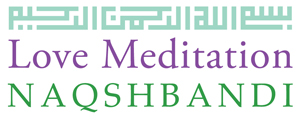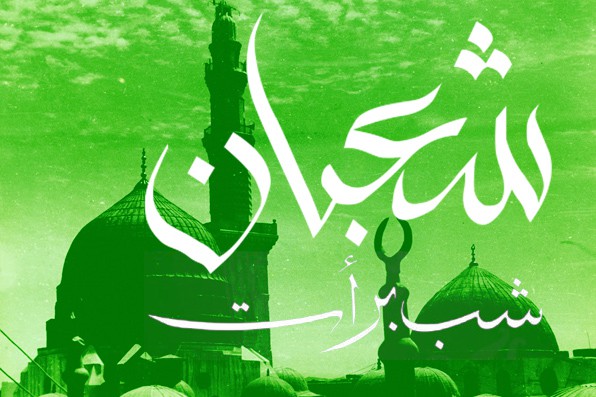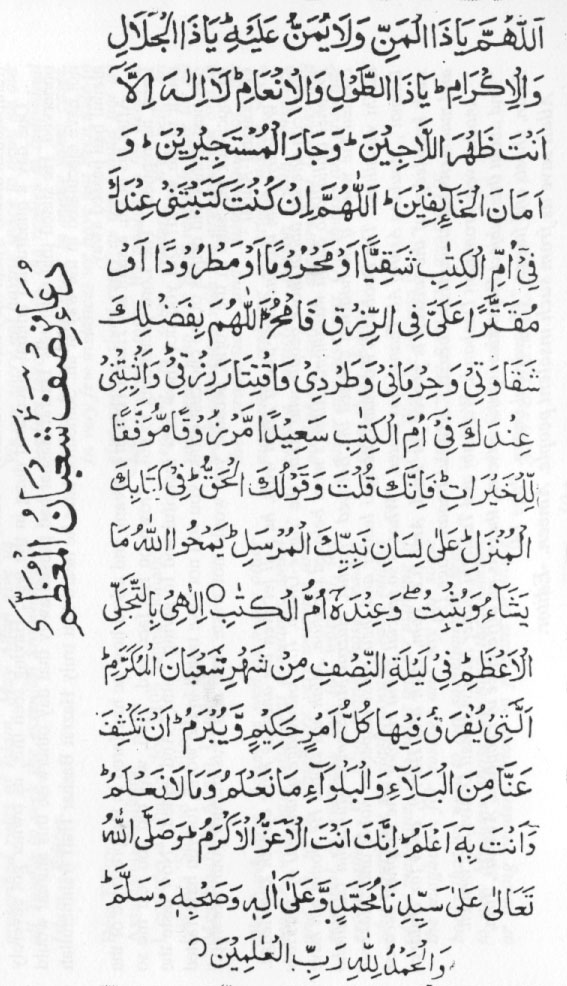15th Shaban (6-7 March 2023) – Laylatul Baraah – Nisf Shaban Dua
15th Shaban (6-7 March 2023) – Laylatul Baraah – Nisf Shaban Dua
15th Shaban – Laylatul Baraah – Nisf Shaban Dua
The Holy Prophet (SWS) said “Allah looks at his creation in the night of Shaban and He forgives all His creation except for a mushrik (idolater) or mushahin (one bent on hatred).” [from Sham, Mu’adh ibn Jabal RA]
There are numerous traditions of the Holy Prophet Muhammad (ﷺ) in which he relates the unique blessings of the 15th of Shaban, Laylatul Baraah. The night of the 15th Sha’ban, is a very blessed night, this is proven from the Holy Qur’an and Ahadith. In this night Allah ﷻ turns specially attentive towards His servants and forgives a great deal of them. Allah ﷻ fulfils their supplications for sustenance and a pleasant life in this World and the next. Allah ﷻ fulfils the requests of the callers in this night. Due to the virtues and blessings of this night, we should supplicate for the forgiveness of the Ummah, our beloved ones and ourselves. There are narrations from approximately 17 Companions of the Prophet ﷺ with respect to the blessings of this night.
Holy Prophet Muhammad (ﷺ) said that, “Whoever fasts three days in the month of Shaban and at the time of breaking fast recites Salawat three times upon me, his sins will be forgiven and his provisions will be amplified, and on the Day of Judgment he will enter Paradise riding on a heavenly mount.”
(Hadith by at-Tirmidhi), Mother of the Believers, Sayyidatuna Aisha (RA) related that she heard from the Holy Prophet Muhammad (ﷺ), “God, Glorious and Exalted, descends to the nearest heaven on the night of the 15th of the month of Shaban, and He forgives more people than the number of hair on the hides of the flocks and herds of sheep of the tribe of Kalb.”
Ibn Majah (RA) narrated the following hadith on the authority of Ali ibn Abu Talib (may Allah be pleased with him):
“If it is the Night of Mid-Shaʿbān then stand in prayer during its night and fast its day. For God descends to the heavens of the earth when the sun sets and says, ‘Is there anyone who seeks forgiveness so that I may forgive him? Is there anyone who seeks provision so that I may grant him provision? Is there anyone afflicted so that I may remove his affliction? Is there not such and such,’ until the dawn breaks.” [Sunan Ibn Majah, Cairo: Dar Ihya’ al-Kutub al-Arabiyya, Vol. 1, p. 444]
(Hadith Nuzhat al-Majalis), Sayyidina Anas (RA) related that he heard from the Holy Prophet Muhammad (ﷺ)) that Jesus (AS) once passed by a mountain and there he saw a white stone. He stared upon it with awe. God revealed to His messenger, “Shall I disclose for you a thing stranger than this?” “Surely!” Jesus answered.
The stone split and from it emerged an old man with a green walking stick in his hand, and pointing to a grape vine he said, “I get my sustenance from here.” Jesus (AS) asked him, “How long have you been busy worshipping God in this stone?” The man replied, “For four hundred years.” Jesus (AS) said to God, “Certainly there is no one else that can worship as he does.” God revealed, “Two cycles (raka’) of prayer by one from the nation of My Beloved Prophet (ﷺ) on the 15th night of the month of Shaban are better than this four hundred years of worship.”
Sadatina Aisha (RA) said “ The Holy Prophet (ﷺ) stood up in prayer during part of the night and made his prostration so lengthy I thought his soul had been taken back. When I saw this I got up and went to move his big toe, whereupon he move, so I drew back. When he raised his head from prostration and finished praying, he said “ O Aisha, O fair little one (humayra!) Did you think that the Prophet had broken his agreement with you? ” She replied “ No, by Allah, O Messenger of Allah but I thought that your soul had been taken back because you stayed in prostration for so long. ” He said “ Do you know what night this is? ” She said “ Allah and His Prophet know best. ” He said “ This is the night of mid-Shaban! Verily Allah the Glorious and Majestic look at His servants on the night of mid Shaban, and He forgives those who ask for forgiveness, and He bestows mercy on those who ask mercy, and He gives delay to the people of envy and spite in their state. ” [Bayhaqi, Shu`ab al-iman, ed. Zaghlul 3:382 #3835]
PRAYERS FOR 15TH SHABAN
The Night of Bara`ah (nisf Sha`ban)
What Prayers are read in this night?
As recommended by Sultan Sheikh Nazim ar-Rabbani (KS), May allah Almighty raise their maqam continuously and bless their family, one may do prayers between Maghrib or Isha prayer
It is advisable to take Ghusl and pray 2 raka Sunnah and read Surah Yasin three times, and after each time, read a special du`a with the following intentions:
1st reading Yasin with the niyyat (intention) of raising ones maqam, or station (and/or Long Life).
2nd reading Yasin with the niyyat (intention) of asking for rizq, Provision (Protection from Calamities).
3rd reading Yasin with the niyyat (intention) of protection from enemies (not being needy to anyone except Allah).
After Isha prayer one should read either:
a) 300 Surah Ikhlas Sharif, or
b) 1,000 Surah Ikhlas Sharif
in any number of rakaat needed to complete the above, e.g. b) 40 rakaat in which 25 Ikhlas Sharif are read in each rakaat.
A way, which does come from Hadith and is mentioned in book Al-Ghunyatu li-Taalibiyi l-Haqq, a work prescribed to Sheikh Abdul Qadir al-Jilani (KS), consists of 100 rakaats. best of all is to pray these in 2-2-2 etc, though it would be acceptable to combine i four, six or eight rakats with one salaam. Sultan Sheikh Nazim ar-Rabbani (KS) prays two – two etc. In each rakaah you pray Suratul Faitha and then ten (10) times Suratul Ikhlas.
Fast of the 15th Sha`ban
On the day immediately following the Night of Bara`ah, i.e. the 15th of Sha`ban, it is mustahabb (advisable) to keep fast. Prophet Muhammad (saws) is reported to have recommended this fast emphatically.
Dua of Shabaan – Nisf Shaban Dua
English Transliteration of Dua Nisf Shaban
Allāhumma yā Dhā ’l-Manni lā yamannu `alayhi aħad,
yā Dhā ’l-Jalāli wa ’l-Ikrām yā Dhā ‘ţ-Ţūli wa ’l-An`ām.
Lā ilāha illa Anta.
Ļahara ’l-lāji’īn wa Jāru ’l-mustajirīn wa Amānu ’l-khā’ifīn.
Allāhumma in kunta katabtanī `indaka fī ummu ’l-Kitābi
shaqīyan aw maħrūman aw maţrūdan aw muqataran `alayya mina ’r-rizq
famħu-llāhumma bi-faļlika shaqāwatī wa ħurmāni wa ţurdī
wa iqtāra rizqī wa thabitnī `indaka fī ummi ’l-kitābi sa`īdan
wa marzūqan li ’l-khayrāti
fa-innaka qulta wa qawluku ’l-ħaqq
fī kitābik al-munzal
`ala lisāni nabīyyika ’l-mursal:
yamħullāhu mā yashā’u wa yuthbitu wa `indahu Ummu ’l-Kitāb.
Ilāhī bi ’t-tajallī al-ā`azhami fī lalayti ’n-nišfi
min shahri sha`bāni ’l-mu`azhami ’l-mukarrami
’llatī yufraqu fīhā kullu amrin ħakīmin wa yubram,
an takshifa `annā mina ’l-balā`i mā na`lamu
wa mā lā na`lamu wa mā Anta bihi ā`alamu
innaka Anta al-A`azzu ’l-Akram.
Wa šalla-Allāhu `alā sayyidinā Muħammadin wa `alā ālihi wa šāħbihi wa sallam.
English Translation of Dua Nisf Shaban
O Allah, Tireless Owner of Bounty. O Owner of Sublimity, Honor, Power, and Blessings.
There is no Allah except You, the Support of refugees and Neighbor of those who seek nearness, Guardian of the fearful.
O Allah, if you have written in Your Book that I be abject, deprived, banished, and tight-fisted,
then erase O Allah, through Your bounty,
my misery, deprivation, banishment, and stinginess
and establish me with You as happy, provided with blessings,
for surely You have said—and Your Word is True—
in Your Revealed Book on the tongue of Your Messenger,
“Allah blots out or confirms what He pleases, and with Him is the Mother of Books.” (13:39)
My God, by the Great Manifestation of the Night of the middle of the Noble Month of Sha`bān
“in which every affair of wisdom is made distinct and authorized,“(44:4)
remove from us calamities—those we know and those we do not know,
and Thou knowest best—for surely You are the Most Mighty, the Most Generous.
May Allah bless Muhammad (SWS) and his Family and Companions (RA).



